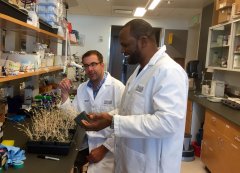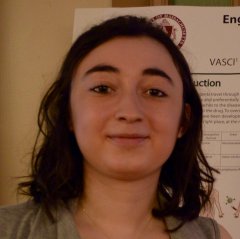News & Announcements
Evolutionary approach to investigating stem cells’ role in fruit yields using a CRISPR/Cas9 multiplex knockout strategy
Evolutionary approach to investigating stem cells’ role in fruit yields using a CRISPR/Cas9 multiplex knockout strategy
Plant genome scientist and evolutionary biologist, Madelaine Bartlett, in collaboration with researchers at Cold Spring Harbor Laboratory, N.Y. and the University of North Carolina, is looking at ways to better understand evolutionary genetics of plants. The National Science Foundation has awarded a four-year $4 million grant ($812,000 to Bartlett) for the team to study genetic regulation of plant stem cells and their role in higher fruit yields. Read more
Onur Oztas PhD Dissertation Defense
Onur Oztas PhD Dissertation Defense
11:00 AM
Friday, January 6, 2017
Life Science Laboratories Building, Room N410
Dissertation Title: HOST MECHANISMS THAT MAINTAIN BACTERIAL PARTNER DURING SYMBIOTIC NITROGEN FIXATION
PI: Dong Wang
Sam Hazen awarded NSF grant to study gene regulation of cell wall growth in Brachypodium in collaboration with local biotechnology group
Sam Hazen awarded NSF grant to study gene regulation of cell wall growth in Brachypodium in collaboration with local biotechnology group
The grass species Brachypodium is a model for the Hazen lab to better understand the transcription networks regulating secondary cell wall biosynthesis. The research grant from the National Science Foundation (NSF) is part of a Small Business Innovation Research program, and the three-year $713,000 award will fund research aimed at demonstrating how higher yields of renewable biomass can be provided by adapting the processes of secondary cell wall gene regulation that take place in grasses. Read More
Life Sciences Graduate Research Symposium
Life Sciences Graduate Research Symposium
The 6th annual UMass Life Sciences Graduate Research Symposium will be held on Friday, December 2. The event brings together graduate students from all areas of life sciences research at UMass to present their work in both talks (9:00 am-5:00 pm, Life Sciences Laboratories Building, Room S340) and a poster session/reception (5:00-6:00 pm). This event is open to everyone who wants to learn about the fantastic life sciences work going on at UMass! The schedule for presentations is available on the LSGRC website.
MCB students awarded NIH funded two-year traineeships through the UMass Biotech Training Program
MCB students awarded NIH funded two-year traineeships through the UMass Biotech Training Program
Graduate students in the MCB Program, Margaux Audett (Maresca Lab) and Heather Sherman (Osborne and Minter Labs), have been awarded 2016 traineeships through the BTP Program. The 2-year NIH funded Traineeships allow the students to continue current research in their home labs, and also offer opportunities to make connections and network with others in the biotech industry through career events, seminars and an annual symposium. Laboratory modules, originally established through the Institute for Cellular Engineering, have been continued through the Biotech Training Program, giving students hands-on experience with cutting edge techniques, and industrial internships for students in BTP are available. Current internships are through Vertex Pharmaceuticals, Sanofi (Genzyme) and the Material and Analytical Sciences team at Boehringer Ingelheim. Read More
Timme-Laragy Recieves Grant from NIEHS Using Zebrafish to Study Possible Genetic and Molecular Links Between Pollutants and Predisposition to Diabetes
Timme-Laragy Recieves Grant from NIEHS Using Zebrafish to Study Possible Genetic and Molecular Links Between Pollutants and Predisposition to Diabetes
Environmental Health Sciences Department member, Alicia Timme-Laragy, has received a 5-Year $1.7 million grant from the National Institute of Environmental Health Sciences for a multi-level study to determine the effects of early life exposure to environmental contaminants. Effects of toxic chemicals commonly found in the environment, such as PCB 126, PFOS and phthalates, will be studied to better understand the development of the pancreas on a genetic, molecular, and biochemical level. The research will look at how pancreas formation is affected by exposure to common pollutants, and how this contributes to diabetes. Read More
BMB Faculty, Dong Wang and Li-Jun Ma, Recognized for Research at International Meeting
BMB Faculty, Dong Wang and Li-Jun Ma, Recognized for Research at International Meeting
Faculty Dong Wang and Li-Jun Ma from the Department of Biochemistry and Molecular Biology were recognized for their research at the 17th International Congress of the International Society for Molecular Plant-Microbe Interactions held July 17-21 in Portland, Ore. Wang received the inaugural MPMI Young Investigator Award and Ma presented a plenary talk at the meeting. Read more.
Maaya Ikeda Doctoral Thesis Defense
Maaya Ikeda Doctoral Thesis Defense
9:00 a.m.
Friday, August 5, 2016
209 French Hall
Thesis Title: The cellular context of estradiol regulation in the zebra finch auditory forebrain
Advisor: Luke Remage-Healey
MCB PhD candidate, Mine Canakci, awarded 2016 AAI Careers in Immunology Fellowship
MCB PhD candidate, Mine Canakci, awarded 2016 AAI Careers in Immunology Fellowship
The American Association of Immunologists have awarded the 2016 AAI Careers in Immunology Fellowship to Molecular and Cellular Biology Graduate Program student, Mine Canacki. Ms. Canacki's research has led to collaborations between immunologists and chemists in the field of biotechnology with a focus on the engineering of antibody conjugated nanogel platforms for targeted drug delivery to T lymphocytes. The AAI Fellowship will support the career development of Ms. Canacki for one year while she conducts research primarily in the lab of Dr. Osborne.
In Press: Edwin Murenzi's current research in NeuroToxicology validates mechanism for studying effects of environmental toxicants on mammalian targets
In Press: Edwin Murenzi's current research in NeuroToxicology validates mechanism for studying effects of environmental toxicants on mammalian targets
MCB Student, Edwin Murenzi's In Press publication forthcoming in the
journal NeuroToxicology addresses his recent work validating a novel
ex-vivo mechanism for studying the effects of various environmental
toxicants on mammalian targets such as voltage-sensitive channels. DDT a
well-known neurotoxic insecticide, has a structural activity
relationship with voltage-sensitive sodium channels (VSSCs) that has
been extensively studied and is well-characterized. Although DDT is a
neurotoxicant, its metabolite DDE has no neurotoxic effects on VSSCs.
This difference provided an excellent candidate for a
"proof-of-principle" experiment for the validation of a new ex-vivo
approach of expressing mammalian brain neurolemma in Xenopus laevis frog
oocytes and studying the effect of various environmental toxicants on
their mammalian targets. Read more






